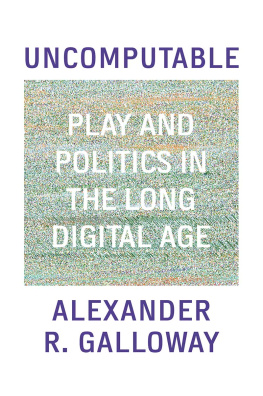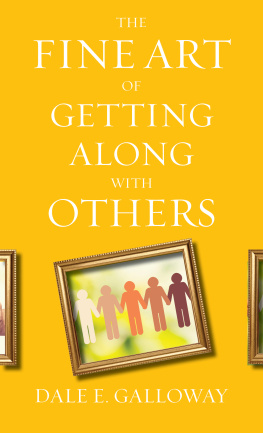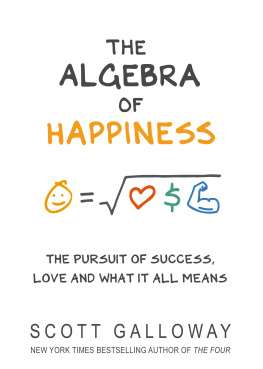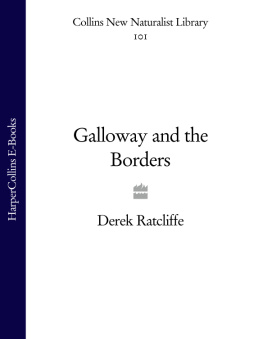Alexander R. Galloway - Uncomputable: Play and Politics In the Long Digital Age
Here you can read online Alexander R. Galloway - Uncomputable: Play and Politics In the Long Digital Age full text of the book (entire story) in english for free. Download pdf and epub, get meaning, cover and reviews about this ebook. publisher: Verso, genre: Art. Description of the work, (preface) as well as reviews are available. Best literature library LitArk.com created for fans of good reading and offers a wide selection of genres:
Romance novel
Science fiction
Adventure
Detective
Science
History
Home and family
Prose
Art
Politics
Computer
Non-fiction
Religion
Business
Children
Humor
Choose a favorite category and find really read worthwhile books. Enjoy immersion in the world of imagination, feel the emotions of the characters or learn something new for yourself, make an fascinating discovery.
- Book:Uncomputable: Play and Politics In the Long Digital Age
- Author:
- Publisher:Verso
- Genre:
- Rating:4 / 5
- Favourites:Add to favourites
- Your mark:
- 80
- 1
- 2
- 3
- 4
- 5
Uncomputable: Play and Politics In the Long Digital Age: summary, description and annotation
We offer to read an annotation, description, summary or preface (depends on what the author of the book "Uncomputable: Play and Politics In the Long Digital Age" wrote himself). If you haven't found the necessary information about the book — write in the comments, we will try to find it.
Uncomputable: Play and Politics In the Long Digital Age — read online for free the complete book (whole text) full work
Below is the text of the book, divided by pages. System saving the place of the last page read, allows you to conveniently read the book "Uncomputable: Play and Politics In the Long Digital Age" online for free, without having to search again every time where you left off. Put a bookmark, and you can go to the page where you finished reading at any time.
Font size:
Interval:
Bookmark:
This eBook is licensed to Christia Shiloxys, christiashiloxys90@gmail.com on 11/16/2021
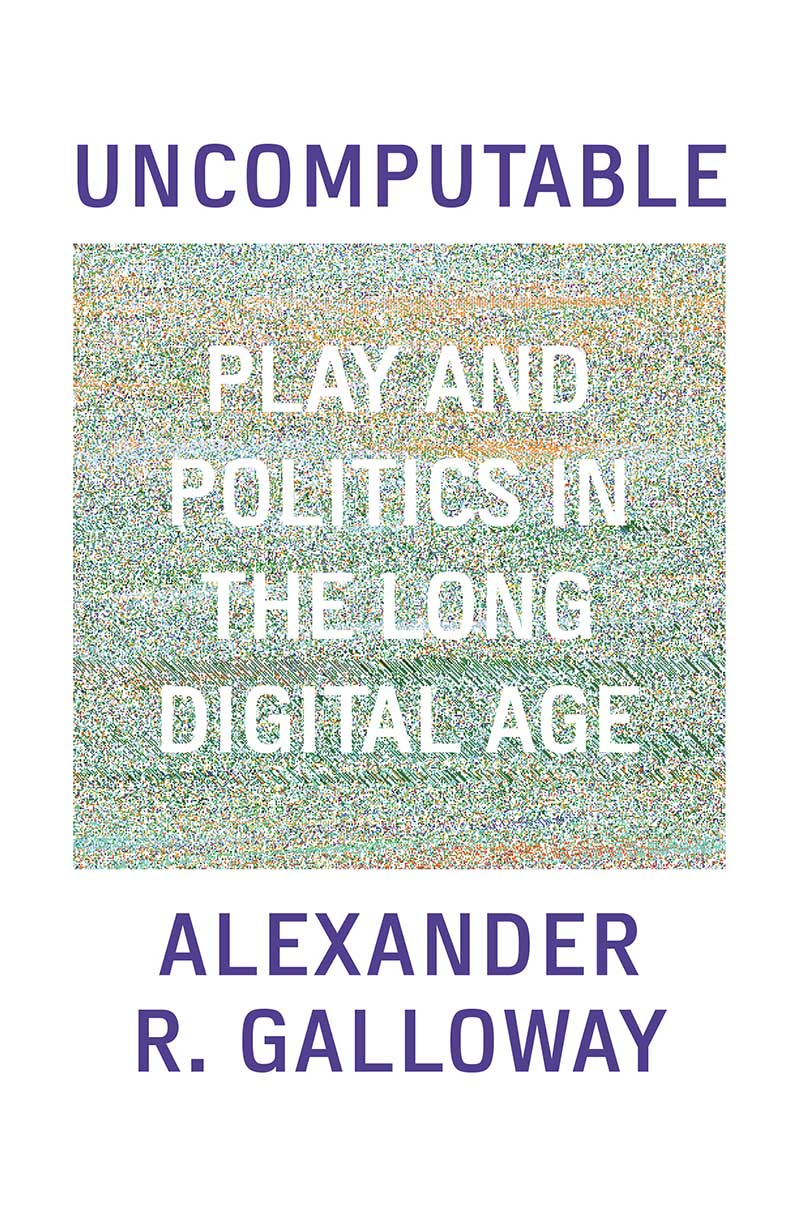
Uncomputable
This eBook is licensed to Christia Shiloxys, christiashiloxys90@gmail.com on 11/16/2021
Uncomputable
Play and Politics In the Long Digital Age
Alexander R. Galloway

This eBook is licensed to Christia Shiloxys, christiashiloxys90@gmail.com on 11/16/2021
First published by Verso 2021
Alexander R. Galloway 2021
All rights reserved
The moral rights of the author have been asserted
1 3 5 7 9 10 8 6 4 2
Verso
UK: 6 Meard Street, London W1F 0EG
US: 20 Jay Street, Suite 1010, Brooklyn, NY 11201
versobooks.com
Verso is the imprint of New Left Books
ISBN-13: 978-1-83976-398-4
ISBN-13: 978-1-83976-399-1 (UK EBK)
ISBN-13: 978-1-83976-400-4 (US EBK)
British Library Cataloguing in Publication Data
A catalogue record for this book is available from the British Library
Library of Congress Cataloging-in-Publication Data
Library of Congress Control Number: 2021941169
Typeset in Minion by Hewer Text UK Ltd, Edinburgh
Printed and bound by CPI Group (UK) Ltd, Croydon CR0 4YY
This eBook is licensed to Christia Shiloxys, christiashiloxys90@gmail.com on 11/16/2021
For JJ
This eBook is licensed to Christia Shiloxys, christiashiloxys90@gmail.com on 11/16/2021
Contents
This eBook is licensed to Christia Shiloxys, christiashiloxys90@gmail.com on 11/16/2021
This eBook is licensed to Christia Shiloxys, christiashiloxys90@gmail.com on 11/16/2021
About ten years ago in the springtime, a few days after my birthday, I received a letter from a lawyers office on the Rue Auber in Paris, a street northwest of the Palais Royal near the old Garnier opera. Letters from lawyers frequently bring bad news, and this was no exception. I am writing to you in my capacity as Legal Advisor to Mrs. Alice debord, the letter began, the sole holder of the pecuniary and moral rights to all of the work of Mr. Guy debord. In unadorned prose, the lawyer informed me I had violated Guy Debords intellectual property. My eyes scanned across phrases like exclusive rights and non-authorized exploitation. As I would later learn, copies of the letter were also sent to my employer and to the director of a non-profit organization where I had been an artist-in-residence.
Guy Debord, the French filmmaker and author, was already fresh on my mind. At the time, I was spending my days and nights on a laptop, writing code for a computer game. Built in collaboration with a small team of coders and artists, the computer game was a re-staging of a relatively unknown late work by Debord, a table-top strategy game called The Game of War that Debord had made in the 1970s. The lawyer from the Rue Auber was unambiguous. Stop working on the game, or we will sue you for copyright violation.
A claim of intellectual property infringement brought by the estate of Guy Debord is ironic, to say the least. This was a man who spent his entire career gleefully copying, sampling, and stealing from Hegel and Hollywood, and everything in-between. Thumbing through my dog-eared copy of The Society of the Spectacle, Debords signature 1967 tract on culture and politics, I eventually found what I was looking for. Chapter eight, paragraph 207, line two, an excerpt from Debords theory of art: Plagiarism is necessary. Progress demands it.
To resolve the matter, I indulged a momentary fantasy. I would simply respond to the lawyer with a few choice citations from Debord himself on the necessity of artistic appropriation, and that would be that. Anyhow, I had no intention of plagiarizing Debord or anyone else. Mine was a research project. I was reenacting a historical algorithm. Besides, what could be more boring than trying to hijack the master of dtournement himself?
I had worked on play and games in the past. But what captivated me most about Debords Game of War was not the ludic element. What captivated me was the algorithmic element. Like other games, Debords project is defined by an algorithm of sorts (its book of rules). The game has binary conditions for winning and losing. The play board is a grid structure, not unlike a data array, or, for that matter, a bitmapped image. Players must even perform simple calculations in their heads during combat. In a certain sense, the game was already a piece of code. Re-staging the game in software was a relatively simple task. Less simple, though, were the mysteries unearthed along the way, mysteries that I would eventually explore and ultimately try to solve.
At the time, I knew I wanted to write about algorithmic culture and the history of computation. Not cybernetics in the narrow sense of Norbert Wiener and Gregory Bateson, but computation as a catchall for the media of multiplicity more generally. Looking at Debords game, I saw an algorithmic artifact, and I wanted to write a history capacious enough to include this project along with other artifacts more explicitly computational. Through a series of connected episodes, this history could delve into some of the precursors of cybernetics from the 1920s, or afterward, into the artificial life experiments of the 1950s. It could talk about networks, supercomputers, and black boxes. It could bring in other formats like weaving and sculpture. It could even try to make a caseperhaps outlandish at first thoughtfor how nineteenth-century photography helped invent computer graphics.
Although its intent was cease and desist, that letter from a decade ago was more of a beginning than an end. Debords Game of War was merely the start of a story that continued well beyond it, into the very nature of the computable and the uncomputable. It set a whole series of things in motion for me, opening up new questions and suggesting a way forward. I had decided not to respond to the lawyer from the Rue Auber. Instead, I decided to write a book
This eBook is licensed to Christia Shiloxys, christiashiloxys90@gmail.com on 11/16/2021
Consider the world's diversity and worship it.
By denying its multiplicity you deny your own true nature.
Derek Jarman, Jubilee (1978)
This eBook is licensed to Christia Shiloxys, christiashiloxys90@gmail.com on 11/16/2021
This book is about the computable and the uncomputable. No general theoryI instead narrate a series of historical episodes. These stories are drawn from the archives of computation and digital media, broadly conceived. The goal is to show how computation emerges or fails to emerge, how the digital thrives but also atrophies, how networks interconnect while also fraying and falling apart.
Such alternationssomething done, something undone; something computed, something uncomputedconstitute the real history of digital machines, from cybernetics and networks to cellular automata and beyond. And, while computers have colonized the globe in recent years, they also excel at various practices of exclusion. The excluded term might be intuition, or it might be aesthetic experience. It might be the flesh or affect. The excluded term might evoke a certain poetry, mysticism, or romanticism. Or it might simply be life, mundane and unexceptional. Uncomputable means all of these things, and more. The gist is that there exists a mode of being in which discrete symbols do not take hold, or at least do not hold sway. And, in the absence of such rational symbols, computation starts to drift and take on another form. Sometimes this is called the realm of life or experience. Sometimes it is called the analog realmyet analog computers are some of the oldest computers.
Font size:
Interval:
Bookmark:
Similar books «Uncomputable: Play and Politics In the Long Digital Age»
Look at similar books to Uncomputable: Play and Politics In the Long Digital Age. We have selected literature similar in name and meaning in the hope of providing readers with more options to find new, interesting, not yet read works.
Discussion, reviews of the book Uncomputable: Play and Politics In the Long Digital Age and just readers' own opinions. Leave your comments, write what you think about the work, its meaning or the main characters. Specify what exactly you liked and what you didn't like, and why you think so.

